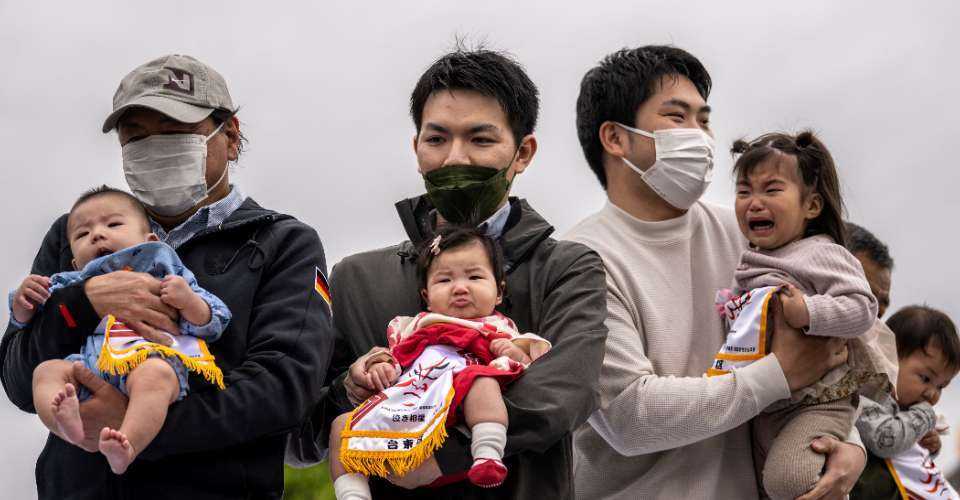
Children held by their fathers stand before their 'Baby-cry Sumo' match' at the Sensoji temple in Tokyo on April 22, 2023. (Photo: AFP)
In the span of two decades, the landscape of fatherhood and marital status in Japan has undergone significant transformations, revealing deep-seated shifts in societal norms, cultural values, and the challenges of work-life balance.
The National Institute of Population and Social Security Research's findings that the lifetime unmarried rate for men soared from 12.57 percent in 2000 to 28.25 percent by 2020, underscores a profound change in the social fabric of Japan.
This dramatic rise in unmarried men coupled with the increasing age of new fathers presents a complex narrative of modern masculinity, societal expectations, and the evolving concept of family in the 21st century.
According to the Ministry of Health, Labor and Welfare's vital statistics survey, in 2022, the number of fathers aged 40 and over who had children (only legitimate children) was 122,161, an increase of 1.4 times from 2002. Fathers in this age group accounted for 16 percent of all fathers.
On the other hand, the number of younger fathers is decreasing. Those in their 20s were 195,578 (25 percent of the total), a decrease of 56 percent from 20 years ago. Those in their 30s were 438,835 (58 percent of the total), a decrease of 27 percent from 20 years ago.
The "Senior Papa Project," initiated by the not-for-profit organization, Fathering Japan, in September 2023, shines a light on a growing demographic: men who embark on the journey of fatherhood in their 40s and beyond.
This initiative aims to foster a community where these fathers can share information and experiences, providing support in navigating the unique challenges they face. The rise in older fatherhood is indicative of broader trends, including later-life marriages, advances in reproductive technologies, and shifting priorities among men regarding career and personal life.
However, this shift comes with its own set of challenges. Older fathers often contend with the dual pressures of child-rearing and caring for aging relatives, all the while managing their responsibilities at work.
The stress associated with balancing these roles can be considerable, affecting not only the fathers themselves but also their families and broader social networks. This situation prompts a critical examination of the support systems in place for older parents and the societal expectations that shape the experiences of fatherhood in Japan.
From a social perspective, the increasing unmarried rate and age of new fathers reflect changing attitudes toward marriage and family life. Traditional expectations for men to marry and start families at a younger age are being reconsidered, as individuals prioritize personal fulfillment, career advancement, and financial stability.
The delay in these life milestones can be attributed primarily to economic insecurity, the high cost of raising children, and a desire for personal development and freedom.
Particularly among the Japanese, who possess a mindset focused on long-term life planning, there's a tendency to reassess their goals at the first sign of stress. This proactive approach is driven by the concern of not fully realizing their ambitions.
The culture of long work hours and the expectation for men to be the primary breadwinners have contributed to the delay in marriage and fatherhood. Furthermore, societal norms that stigmatize unmarried individuals and older parents can exacerbate the challenges they face, leading to social isolation and increased stress.
In terms of work, the demands of Japan's corporate culture often conflict with the responsibilities of fatherhood, especially for older fathers who may also be in more senior positions with greater responsibilities.
The struggle to achieve a work-life balance is a significant concern, highlighting the need for more flexible working arrangements and supportive workplace policies. Companies and policymakers are increasingly called upon to recognize the changing dynamics of family life and to implement measures that support fathers in fulfilling their roles both at work and at home.
The "Senior Papa Project" is a response to these trends, offering a platform for older fathers to connect, share their experiences, and advocate for a better understanding of fatherhood. By bringing attention to the unique challenges faced by this demographic, the project aims to foster a dialogue about how society can better support older parents in balancing their work and family lives.
*The views expressed in this article are those of the author and do not necessarily reflect the official editorial position of UCA News.


